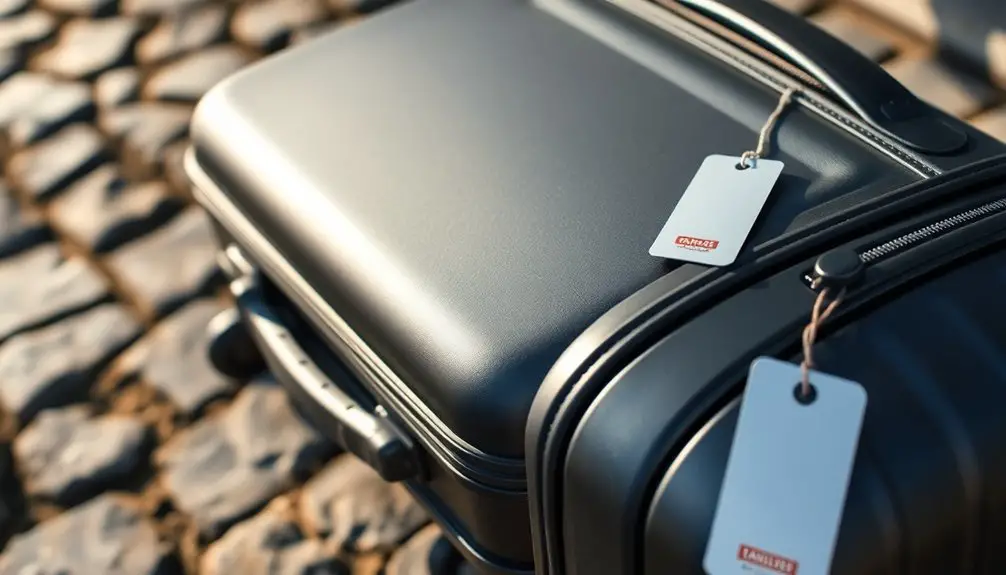Polypropylene suitcases offer a lightweight and budget-friendly option for travelers. They provide decent durability, making them suitable for weekend trips or occasional travel. With good impact resistance and shock absorption, these suitcases protect your belongings from minor mishaps. They also boast features like chemical resistance and waterproof capabilities, adding to their longevity. However, they're not as durable as polycarbonate options, especially under extreme conditions. If you're looking for a solid balance between cost and performance, polypropylene might be your best bet. Keep exploring to uncover which luggage options best fit your travel needs!
Key Takeaways
- Polypropylene suitcases are lightweight and offer decent durability, making them suitable for casual travel and weekend getaways.
- They feature high tensile strength (approximately 4,800 psi) and flexibility for improved impact resistance and shock absorption.
- Their waterproof and chemical-resistant nature protects belongings, enhancing longevity in various travel conditions.
- While not as durable as polycarbonate, polypropylene is budget-friendly, ideal for occasional travelers looking for cost-effective luggage options.
- Consider travel frequency and protection needs when choosing luggage; polypropylene suits occasional trips, while frequent travelers may prefer more robust materials like polycarbonate.
Understanding Polypropylene Suitcases
When it comes to choosing luggage, polypropylene suitcases stand out for their impressive balance of lightweight design and durability. If you're seeking an easy-to-handle option that won't weigh you down, polypropylene is an excellent choice. This material is lightweight yet offers decent durability for casual use, making it perfect for weekend getaways or short trips.
One of the key features of polypropylene is its flexibility, which enhances impact resistance. It can absorb shocks better than many other hard-shell options, ensuring your belongings stay protected during transit.
Plus, polypropylene suitcases are chemical resistant and waterproof, making them suitable for various travel environments. Whether you encounter spills or adverse weather, your items will remain safe and dry.
They also have a tensile strength of approximately 4,800 psi, making them capable of handling heavy loads.
Another significant advantage is that these suitcases are budget-friendly. You'll find that polypropylene luggage provides a good price-performance ratio, allowing you to enjoy essential features without breaking the bank.
While they may not be as robust as polycarbonate alternatives, they serve as a reliable option for those who prioritize lightweight and versatile luggage. Overall, polypropylene suitcases offer a solid mix of practicality and affordability for today's traveler.
Durability of Polypropylene Material
Durability is a crucial factor to consider when selecting luggage, and polypropylene material offers a unique blend of strengths and limitations. This lightweight option is perfect for casual travel, providing decent durability while being easy to handle. You'll appreciate its waterproof nature and good chemical resistance, which help protect your belongings from spills and moisture. Additionally, polypropylene's high melting point of approximately 160°C provides heat resistance, making it suitable for various applications.
| Strengths | Limitations | Best For |
|---|---|---|
| Lightweight | Lower breaking strength | Infrequent travelers |
| Waterproof | Less impact resistance | Budget-friendly options |
| Good chemical resistance | May not withstand severe impacts | Casual travel |
While polypropylene offers flexibility and shock absorbency, it may not be your best choice for rugged or frequent travel. The material's breaking strength can decrease at freezing temperatures, posing risks in extreme weather. Overall, polypropylene is an excellent choice if you're looking for budget-friendly luggage that meets casual travel needs without the expectation of high-end durability.
Comparing Luggage Materials

Choosing the right luggage material can make all the difference in your travel experience. When comparing luggage materials, you'll find that polypropylene (PP) stands out as a lightweight and budget-friendly option. It's ideal for casual travelers seeking a suitcase that won't weigh them down.
However, while polypropylene offers moderate durability and decent impact resistance, it may not hold up as well under severe stress, especially when compared to sturdier materials like polycarbonate.
Polypropylene is chemical and temperature resistant, which provides some protection against environmental factors, making it classified under recycling code #5. Yet, if you're a frequent traveler, you might want to consider alternatives that deliver enhanced durability and protection.
Polycarbonate luggage, for instance, tends to be more rigid and resilient, making it a better choice for those who travel often or need to pack heavier items.
While polypropylene is a robust choice for short trips, its limitations in extreme conditions could lead you to explore options with higher durability.
Ultimately, your decision should reflect how often you travel and the level of protection you need for your belongings. Balancing lightweight convenience with durability will guide you to the right suitcase for your adventures.
Cost Considerations for Luggage
Luggage costs can significantly impact your travel budget, so it's smart to weigh your options carefully. When considering polypropylene luggage, you'll find it offers a budget-friendly price point, typically ranging from $50 to $150. This affordability makes it an appealing choice for occasional travelers looking for cost-effective solutions.
However, while polypropylene luggage is less expensive than premium materials like polycarbonate, it may sacrifice some durability. If you're a frequent traveler, investing in more robust materials might yield better long-term value. Lower upfront costs could result in higher expenses down the line if your luggage doesn't hold up as well over time. A durable alternative to consider is High-Density Polyethylene (HDPE) luggage, which boasts rot and rust resistance and can last for 25-30 years with minimal upkeep.
Brands like American Tourister offer polypropylene options that provide good value without skimping on essential features like shock absorption and flexibility. For occasional travelers, this can be a great balance between cost considerations and necessary functionality.
Ultimately, you should evaluate your travel habits. If you travel infrequently, the cost-effectiveness of polypropylene luggage may suit your needs. But for frequent trips, consider investing in more durable options to ensure you get the best value for your money in the long run.
Recommendations for Durable Luggage

When you're looking for durable luggage, it's important to consider the right materials and brands that can withstand the rigors of travel.
Polypropylene suitcases are a great choice for casual travelers seeking budget-friendly options with a balance of lightweight flexibility and durability. However, if you're a frequent traveler, you may want to explore alternatives that offer superior impact resistance. Additionally, some travelers may prioritize eco-friendly options, as they consider the environmental impact of their luggage choices, such as the production of plastic materials releasing harmful chemicals into the atmosphere.
Here are some recommendations:
- American Tourister Soundbox: Utilizes polypropylene for its shock-absorbing qualities, making it perfect for everyday travel needs.
- Delsey Helium Aero: Features robust designs and a lightweight build, offering a stylish yet durable option in polycarbonate for those needing extra durability.
- Samsonite Winfield 3: Another polycarbonate option, renowned for its high impact resistance and long-lasting performance.
- Travelpro Maxlite 5: Offers a range of lightweight and highly durable luggage options, ideal for frequent travelers who prefer flexibility without compromising quality.
Frequently Asked Questions
Is Polypropylene Good for Suitcases?
Polypropylene's a decent choice for suitcases if you're looking for something lightweight and budget-friendly. It offers moderate durability for occasional trips, but it might not hold up well under severe stress compared to stronger materials.
Which Luggage Material Is Most Durable?
When choosing luggage materials, polycarbonate tops the list for durability, followed by polypropylene. If you're a frequent traveler, opt for polycarbonate; it offers better protection against impacts compared to the lighter, more affordable polypropylene.
Are Polypropylene Bags Durable?
Polypropylene bags offer moderate durability, making them suitable for occasional trips. They're lightweight and flexible, but they can crack under extreme stress or freezing temperatures, so consider your travel frequency before choosing this material.
Do Airlines Prefer Hard or Soft Luggage?
Airlines don't have a strict preference for hard or soft luggage. It really depends on your travel style. Consider your packing habits and the types of belongings you carry to decide what works best for you.

